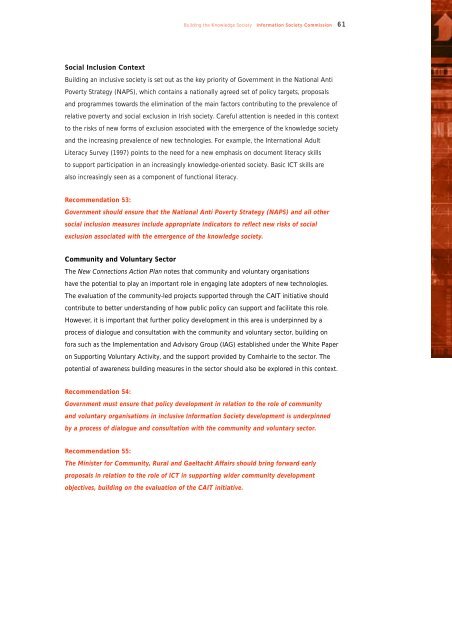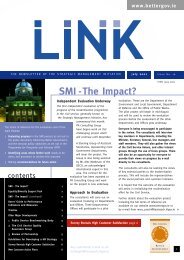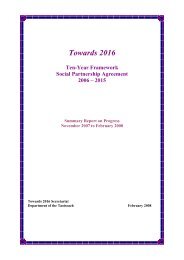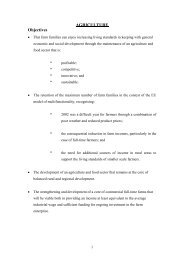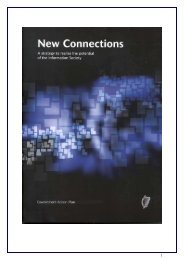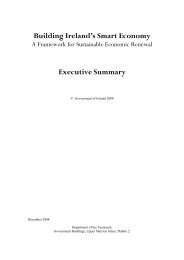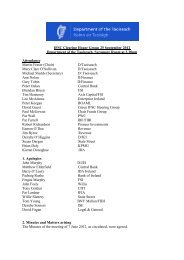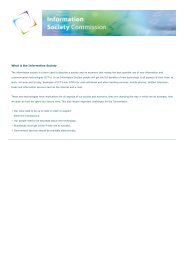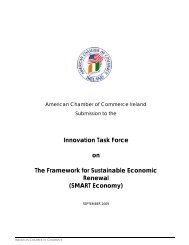Building the Knowledge Society - Department of Communications ...
Building the Knowledge Society - Department of Communications ...
Building the Knowledge Society - Department of Communications ...
You also want an ePaper? Increase the reach of your titles
YUMPU automatically turns print PDFs into web optimized ePapers that Google loves.
<strong>Building</strong> <strong>the</strong> <strong>Knowledge</strong> <strong>Society</strong> Information <strong>Society</strong> Commission 61Social Inclusion Context<strong>Building</strong> an inclusive society is set out as <strong>the</strong> key priority <strong>of</strong> Government in <strong>the</strong> National AntiPoverty Strategy (NAPS), which contains a nationally agreed set <strong>of</strong> policy targets, proposalsand programmes towards <strong>the</strong> elimination <strong>of</strong> <strong>the</strong> main factors contributing to <strong>the</strong> prevalence <strong>of</strong>relative poverty and social exclusion in Irish society. Careful attention is needed in this contextto <strong>the</strong> risks <strong>of</strong> new forms <strong>of</strong> exclusion associated with <strong>the</strong> emergence <strong>of</strong> <strong>the</strong> knowledge societyand <strong>the</strong> increasing prevalence <strong>of</strong> new technologies. For example, <strong>the</strong> International AdultLiteracy Survey (1997) points to <strong>the</strong> need for a new emphasis on document literacy skillsto support participation in an increasingly knowledge-oriented society. Basic ICT skills arealso increasingly seen as a component <strong>of</strong> functional literacy.Recommendation 53:Government should ensure that <strong>the</strong> National Anti Poverty Strategy (NAPS) and all o<strong>the</strong>rsocial inclusion measures include appropriate indicators to reflect new risks <strong>of</strong> socialexclusion associated with <strong>the</strong> emergence <strong>of</strong> <strong>the</strong> knowledge society.Community and Voluntary SectorThe New Connections Action Plan notes that community and voluntary organisationshave <strong>the</strong> potential to play an important role in engaging late adopters <strong>of</strong> new technologies.The evaluation <strong>of</strong> <strong>the</strong> community-led projects supported through <strong>the</strong> CAIT initiative shouldcontribute to better understanding <strong>of</strong> how public policy can support and facilitate this role.However, it is important that fur<strong>the</strong>r policy development in this area is underpinned by aprocess <strong>of</strong> dialogue and consultation with <strong>the</strong> community and voluntary sector, building onfora such as <strong>the</strong> Implementation and Advisory Group (IAG) established under <strong>the</strong> White Paperon Supporting Voluntary Activity, and <strong>the</strong> support provided by Comhairle to <strong>the</strong> sector. Thepotential <strong>of</strong> awareness building measures in <strong>the</strong> sector should also be explored in this context.Recommendation 54:Government must ensure that policy development in relation to <strong>the</strong> role <strong>of</strong> communityand voluntary organisations in inclusive Information <strong>Society</strong> development is underpinnedby a process <strong>of</strong> dialogue and consultation with <strong>the</strong> community and voluntary sector.Recommendation 55:The Minister for Community, Rural and Gaeltacht Affairs should bring forward earlyproposals in relation to <strong>the</strong> role <strong>of</strong> ICT in supporting wider community developmentobjectives, building on <strong>the</strong> evaluation <strong>of</strong> <strong>the</strong> CAIT initiative.


